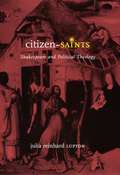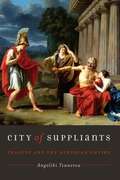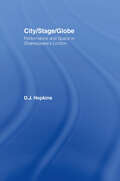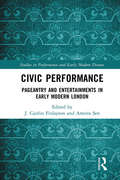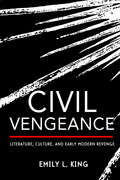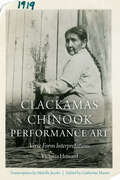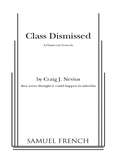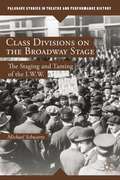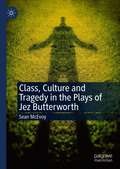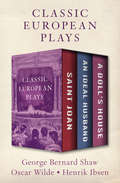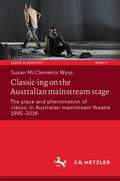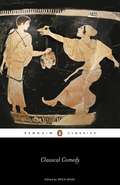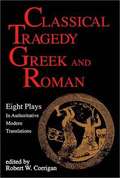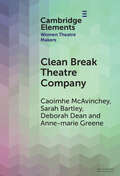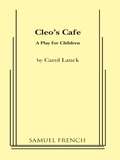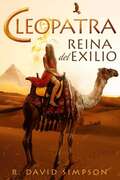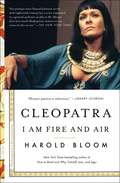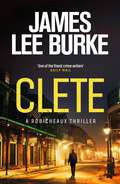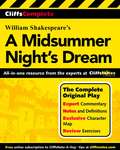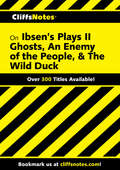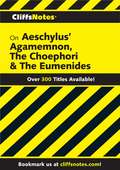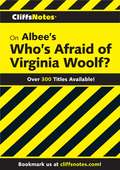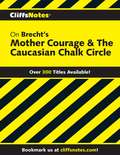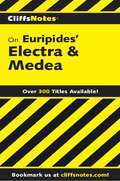- Table View
- List View
Citizen-Saints: Shakespeare and Political Theology
by Julia Reinhard LuptonTurning to the potent idea of political theology to recover the strange mix of political and religious thinking during the Renaissance, this bracing study reveals in the works of Shakespeare and his sources the figure of the citizen-saint, who represents at once divine messenger and civil servant, both norm and exception. Embodied by such diverse personages as Antigone, Paul, Barabbas, Shylock, Othello, Caliban, Isabella, and Samson, the citizen-saint is a sacrificial figure: a model of moral and aesthetic extremity who inspires new regimes of citizenship with his or her death and martyrdom. Among the many questions Julia Reinhard Lupton attempts to answer under the rubric of the citizen-saint are: how did states of emergency, acts of sovereign exception, and Messianic anticipations lead to new forms of religious and political law? What styles of universality were implied by the abject state of the pure creature, at sea in a creation abandoned by its creator? And how did circumcision operate as both a marker of ethnicity and a means of conversion and civic naturalization? Written with clarity and grace, Citizen-Saints will be of enormous interest to students of English literature, religion, and early modern culture.
City Stages
by Michael MckinnieIn every major city, there exists a complex exchange between urban space and the institution of the theatre. City Stages is an interdisciplinary and materialist analysis of this relationship as it has existed in Toronto since 1967. Locating theatre companies ? their sites and practices ? in Toronto?s urban environment, Michael McKinnie focuses on the ways in which the theatre has adapted to changes in civic ideology, environment, and economy. Over the past four decades, theatre in Toronto has been increasingly implicated in the civic self-fashioning of the city and preoccupied with the consequences of the changing urban political economy. City Stages investigates a number of key questions that relate to this pattern. How has theatre been used to justify certain forms of urban development in Toronto? How have local real estate markets influenced the ways in which theatre companies acquire and use performance space? How does the analysis of theatre as an urban phenomenon complicate Canadian theatre historiography? McKinnie uses the St. Lawrence Centre for the Arts and the Toronto Centre for the Performing Arts as case studies and considers theatrical companies such as Theatre Passe Muraille, Toronto Workshop Productions, Buddies in Bad Times, and Necessary Angel in his analysis. City Stages combines primary archival research with the scholarly literature emerging from both the humanities and social sciences. The result is a comprehensive and empirical examination of the relationship between the theatrical arts and the urban spaces that house them.
City of Suppliants: Tragedy and the Athenian Empire
by Angeliki TzanetouAfter fending off Persia in the fifth century BCE, Athens assumed a leadership position in the Aegean world. Initially it led the Delian League, a military alliance against the Persians, but eventually the league evolved into an empire with Athens in control and exacting tribute from its former allies. Athenians justified this subjection of their allies by emphasizing their fairness and benevolence towards them, which gave Athens the moral right to lead. But Athenians also believed that the strong rule over the weak and that dominating others allowed them to maintain their own freedom. These conflicting views about Athens' imperial rule found expression in the theater, and this book probes how the three major playwrights dramatized Athenian imperial ideology. Through close readings of Aeschylus' Eumenides, Euripides' Children of Heracles, and Sophocles' Oedipus at Colonus, as well as other suppliant dramas, Angeliki Tzanetou argues that Athenian tragedy performed an important ideological function by representing Athens as a benevolent and moral ruler that treated foreign suppliants compassionately. She shows how memorable and disenfranchised figures of tragedy, such as Orestes and Oedipus, or the homeless and tyrant-pursued children of Heracles were generously incorporated into the public body of Athens, thus reinforcing Athenians' sense of their civic magnanimity. This fresh reading of the Athenian suppliant plays deepens our understanding of how Athenians understood their political hegemony and reveals how core Athenian values such as justice, freedom, piety, and respect for the laws intersected with imperial ideology.
City/Stage/Globe: Performance and Space in Shakespeare's London (Literary Criticism and Cultural Theory)
by D.J. HopkinsThis interdisciplinary study theorizes the interaction of individual performance and social space. Examining three categories of space – the urban, the theatrical, and the cartographic – this volume considers the role of performance in the production and operation of these spaces during a period in London’s history defined roughly by the life of Shakespeare. City/Stage/Globe not only organizes a selection of plays, pageants, maps, and masques in the historical and cultural contexts in which they emerged, but also uses performance theory to locate the ways in which these seemingly ephemeral events contributed to lasting change in the spatial concepts and physical topograpy of early modern London.
Civic Performance: Pageantry and Entertainments in Early Modern London (Studies in Performance and Early Modern Drama)
by J. Caitlin Finlayson Amrita SenCivic Performance: Pageantry and Entertainments in Early Modern London brings together a group of essays from across multiple fields of study that examine the socio-cultural, political, economic, and aesthetic dimensions of pageantry in sixteenth and seventeenth-century London. This collection engages with modern interest in the spectacle and historical performances of pageantry and entertainments, including royal entries, progresses, coronation ceremonies, Lord Mayor’s Shows, and processions. Through a discussion of the extant texts, visual records, archival material, and emerging projects in the digital humanities, the chapters elucidate the forms in which the period itself recorded its public rituals, pageantry, and ephemeral entertainments. The diversity of approaches contained in these chapters reflects the collaborative nature of pageantry and civic entertainments, as well as the broad socio-cultural resonances of this form of drama, and in doing so offers a study that is multi-faceted and wide-ranging, much like civic performance itself. Ideal for scholars of Early Modern global politics, economics, and culture; literary and performance studies; print culture; and the digital humanities, Civic Performance casts a new lens on street pageantry and entertainments in the historically and culturally significant locus of Early Modern London.
Civil Vengeance: Literature, Culture, and Early Modern Revenge
by Emily L. KingWhat is revenge, and what purpose does it serve? On the early modern English stage, depictions of violence and carnage—the duel between Hamlet and Laertes that leaves nearly everyone dead or the ghastly meal of human remains served at the end of Titus Andronicus—emphasize arresting acts of revenge that upset the social order. Yet the subsequent critical focus on a narrow selection of often bloody "revenge plays" has overshadowed subtler and less spectacular modes of vengeance present in early modern culture.In Civil Vengeance, Emily L. King offers a new way of understanding early modern revenge in relation to civility and community. Rather than relegating vengeance to the social periphery, she uncovers how facets of society—church, law, and education—relied on the dynamic of retribution to augment their power such that revenge emerges as an extension of civility. To revise the lineage of revenge literature in early modern England, King rereads familiar revenge tragedies (including Marston's Antonio's Revenge and Kyd's The Spanish Tragedy) alongside a new archive that includes conduct manuals, legal and political documents, and sermons. Shifting attention from episodic revenge to quotidian forms, Civil Vengeance provides new insights into the manner by which retaliation informs identity formation, interpersonal relationships, and the construction of the social body.
Clackamas Chinook Performance Art: Verse Form Interpretations (Studies in the Anthropology of North American Indians)
by Victoria HowardPublished through the Recovering Languages and Literacies of the Americas initiative, supported by the Andrew W. Mellon FoundationVictoria Howard was born around 1865, a little more than ten years after the founding of the Confederated Tribes of Grand Ronde in western Oregon. Howardʼs maternal grandmother, Wagayuhlen Quiaquaty, was a successful and valued Clackamas shaman at Grand Ronde, and her maternal grandfather, Quiaquaty, was an elite Molalla chief. In the summer of 1929 the linguist Melville Jacobs, student of Franz Boas, requested to record Clackamas Chinook oral traditions with Howard, which she enthusiastically agreed to do. The result is an intricate and lively corpus of linguistic and ethnographic material, as well as rich performances of Clackamas literary heritage, as dictated by Howard and meticulously transcribed by Jacobs in his field notebooks. Ethnographical descriptions attest to the traditional lifestyle and environment in which Howard grew up, while fine details of cultural and historical events reveal the great consideration and devotion with which she recalled her past and that of her people.Catharine Mason has edited twenty-five of Howard&’s spoken-word performances into verse form entextualizations, along with the annotations provided by Jacobs in his publications of Howard&’s corpus in the late 1950s. Mason pairs performances with biographical, family, and historical content that reflects Howardʼs ancestry, personal and social life, education, and worldview. Mason&’s study reveals strong evidence of how the artist contemplated and internalized the complex meanings and everyday lessons of her literary heritage.
Class Dismissed
by Craig J. NeviusA 19 year old high school graduate wrote this wonderful play about an English teacher who is frustrated with his students' lackadaisical approach to their education and takes severe measures: he holds his toughest students hostage in his classroom. They are an egocentric jock, the obnoxious class clown, the sensitive male and female intellectuals and the flippant prom queen. The lesson they learn is not about English but about life.
Class Divisions on the Broadway Stage
by Michael SchwartzExamining twenty-five years of theatre history, this book covers the major plays that feature representations of the Industrial Workers of the World. American class movement and class divisions have long been reflected on the Broadway stage and here Michael Schwartz presents a fresh look at the conflict between labor and capital.
Class, Culture and Tragedy in the Plays of Jez Butterworth
by Sean McEvoyJez Butterworth is undoubtedly one of the most popular and commercially successful playwrights to have emerged in Britain in the early twenty-first century. This book, only the second so far to have been written on him, argues that the power of his most acclaimed work comes from a reinvigoration of traditional forms of tragedy expressed in a theatricalized working-class language. Butterworth’s most developed tragedies invoke myth and legend as a figurative resistance to the flat and crushing instrumentalism of contemporary British political and economic culture. In doing so they summon older, resonant narratives which are both popular and high-cultural in order to address present cultural crises in a language and in a form which possess wide appeal. Tracing the development of Butterworth’s work chronologically from Mojo (1995) to The Ferryman (2017), each chapter offers detailed critical readings of a single play, exploring how myth and legend become significant in a variety of ways to Butterworth’s presentation of cultural and personal crisis.
Classic European Plays: Saint Joan, An Ideal Husband, and A Doll's House
by George Bernard Shaw Henrik Ibsen Oscar WildeThese three timeless plays showcase the sparkling wit and provocative intellect of some of modern drama&’s greatest playwrights.Saint Joan by George Bernard Shaw: This complex drama depicts the life of Joan of Arc—from her childhood vision calling her to lead the French army against the English in the Hundred Years War through her eventual capture, trial, and burning at the stake. An epilogue depicts a retrial that clears Joan of heresy, declaring her a Christian martyr.An Ideal Husband by Oscar Wilde: In this timeless drawing room comedy, a blackmail scheme forces a married couple to reexamine their moral standards—providing a wry commentary on the hypocrisy of politicians. Carried along by nonstop witty repartee, this is satirical theater at its finest.A Doll&’s House by Henrik Ibsen: This quintessential work of dramatic realism depicts one woman&’s struggle against patriarchal society. The central character&’s rejection of a smothering marriage shocked theatergoers of the late nineteenth century while the play&’s pioneering style set the stage for twentieth century domestic drama.
Classic-ing on the Australian mainstream stage: The place and phenomenon of classic in Australian mainstream theatre 1995-2016 (Szene & Horizont. Theaterwissenschaftliche Studien #11)
by Susan McClements WyssThis book evaluates classic drama as an active creation. To classic is a complex theatrical practice that animates program choice, casting and staging, audience reception and critical response. Analysis of six distinct examples of pre-determined and self-nominated classic productions on the Australian mainstage is informed by postcolonial theory, specifically the settler dilemma of Indigenous cultural authority. What happens to the political edge of postcolonial aspiration within the status of classic? Close consideration of staging and casting, theatre historical perspectives, and interviews with key artists, expands the concept of classic as a dimension of theatrical and not only of dramatic reception. This book responds to a polarised debate that focused on auteur directors and the relative value of new vs classic plays. Rather than adopting a position, the study undertakes a deeper assessment of the phenomenon and place of the dramatic classic in Australian mainstream theatre.
Classical Comedy: The Comedies Of Aristophanes (Aris And Phillips Classical Texts)
by Aristophanes Terence Plautus MenanderFrom the fifth to the second century BC, innovative comedy drama flourished in Greece and Rome. This collection brings together the greatest works of Classical comedy, with two early Greek plays: Aristophanes' bold, imaginative Birds, and Menander's The Girl from Samos, which explores popular contemporary themes of mistaken identity and sexual misbehaviour; and two later Roman comic plays: Plautus' The Brothers Menaechmus - the original comedy of errors - and Terence's bawdy yet sophisticated double love-plot, The Eunuch. Together, these four plays demonstrate the development of Classical comedy, celebrating its richness, variety and extraordinary legacy to modern drama.
Classical Tragedy Greek and Roman: 8 Plays in Authoritative Modern Translations Accompanied by Critical Essays
by Robert W. CorriganA collection of eight plays along with accompanying critical essays. Includes: "The Oresteia" Aeschylus; "Prometheus Bound" Aeschylus; "Oedipus the King" Sophocles; "Antigone" Sophocles; "Medea" Euripides; "The Bakkhai" Euripides; "Oedipus" Seneca; "Medea" Seneca.
Clean Break Theatre Company (Elements in Women Theatre Makers)
by Caoimhe McAvinchey Anne-marie Greene Deborah Dean Sarah BartleyClean Break Theatre Company is a women-only theatre company that grew out of a prisoner-led drama workshop that took place between 1977–1979 in HMP Askham Grange. In addition to its considerable impact on criminalised women and public understandings of the socio-political impact of their experiences, Clean Break has had a significant but under-acknowledged impact on contemporary British theatre. We examine three areas of Clean Break's theatre making history and organisational practices: its origin stories; its education and engagement work; and how the company's performance practices have, across five decades, 'then' and 'now', adapted to directly intervene in carceral society. By highlighting Clean Break's distinct activist theatre making processes and practices, the book makes explicit the genealogical connections of the company's past work and its impacts on contemporary feminist theatre practices.
Cleo's Cafe
by Carol LauckChildren's playm / 2 m., 4 f. / Interior / Cleo's Cafe fascinates the very young with puppetry and robots while delighting older children and adults with a comical, intelligent, contemporary plot. When Cleo wants to buy and manage the cafe where she works and tries to convince Pierre to be her partner, an excitable chef who flies into tantrums over lost recipes and gives musical French lessons, Pierre reluctantly agrees with one condition-- Cleo must regain the customers lost by the former manager. A puppeteer offers some unusual help and chaos ensues when his robot goes berserk. A zany canary puppet and a bewildered customer add to the hilarity.
Cleopatra, Reina del Exilio (1 #1)
by Robert Simpsoncleopatra, reina del exilio Cleopatra, reina muerte de Egipto, enfrentada a una segura por parte de su marido molesto, se ve obligada a huir de Egipto, reunir un ejército, luego regresa a Egipto para reclamar su trono con la ayuda del líder romano, César. OTCA 1; La escena comienza con tres mujeres griegas ricas, que planean prestar dinero al César. Luego; CLEOPATRA y CÉSAR están a bordo del barco real, esperando que se cargue el barco. Están a punto de zarpar para un viaje de dos meses por el río Nilo a cataratas y de regreso. Mientras esperan que el barco zarpe, Cleopatra le pregunta a César sobre sus conquistas en la Galia e Inglaterra. Mientras responde, recuerda lo que pensaba de los galos y los ingleses y cómo reaccionaban los hombres al llegar a las costas de la costa inglesa. Vemos que le preocupan sus deudas, comida para los hombres y quebrantar las leyes romanas sobre el ataque a la Galia. También ve a Cleopatra como Reina y una oportunidad para expandir sus planes de hacerse cargo del Imperio Romano y también de Egipto a través de Cleopatra. Como César lucha en Europa. Cleopatra tiene sus propios problemas en Egipto. Ella tiene una audiencia con la gente común que está teniendo problemas para pagar impuestos debido a la sequía y al bajo río Nilo que alimenta los campos. Ella otorga a una persona en particular, la libertad de impuestos, anulando el consejo de su asesor. Luego deja la 'sala de audiencia' para ir a sus habitaciones, pero en el camino se encuentra con su hermano de diez años y sus asesores. Incluso a las diez, su hermano es bastante astuto y entiende su papel y exige saber por qué su cara no está en las nuevas monedas, recién emitidas. Ella responde que él no está haciendo todo el trabajo y que todavía disfruta de los juegos infantiles. Se enoja mucho.
Cleopatra: I Am Fire and Air (Shakespeare's Personalities #2)
by Harold BloomFrom Harold Bloom, one of the greatest Shakespeare scholars of our time, comes an intimate, wise, deeply compelling portrait of Cleopatra—one of the Bard’s most riveting and memorable female characters.Cleopatra is one of the most famous women in history—and thanks to Shakespeare, one of the most intriguing personalities in literature. She is lover of Marc Antony, defender of Egypt, and, perhaps most enduringly, a champion of life. Cleopatra is supremely vexing, tragic, and complex. She has fascinated readers and audiences for centuries and has been played by the greatest actresses of their time, from Elizabeth Taylor to Vivien Leigh to Janet Suzman to Judi Dench. Award-winning writer and beloved professor Harold Bloom writes about Cleopatra with wisdom, joy, exuberance, and compassion. He also explores his own personal relationship to the character: Just as we encounter one Anna Karenina or Jay Gatsby when we are in high school and college and another when we are adults, Bloom explains his shifting understanding of Cleopatra over the course of his own lifetime. The book becomes an extraordinarily moving argument for literature as a path to and a measure of our own humanity. Bloom is mesmerizing in the classroom, wrestling with the often tragic choices Shakespeare’s characters make. With Cleopatra, he delivers exhilarating clarity and invites us to look at this character as a flawed human who might be living in our world. The result is an invaluable resource from our greatest literary critic.
Clete (Dave Robicheaux)
by James Lee BurkeIn the latest Robicheaux novel, Clete Purcel - veteran, private investigator, and former New Orleans cop - takes centre stage for the first time. ****Clete Purcel - private investigator, ex-member of the New Orleans Police Department, and war veteran with a hard shell and just a few soft spots - is Dave Robicheaux's longtime friend and partner in detective work. But he has a troubled past.When Clete leaves his car at the local car wash, only to return to find it ransacked by a group of thugs tied to the drug trade from Mexican cartels to Louisiana, it feels personal - his grandniece died of a fentanyl overdose, and his fists curl when he thinks of the dealers who sold it.Just as Clete starts to trail the culprits, Clara Bow hires Clete as a detective to investigate her scheming, slippery ex-husband, and a string of brutal deaths all link back to a heavily tattooed man who seems to lurk around every corner. Clete is experiencing shockingly lifelike hallucinations and questioning Clara's ulterior motives when he and Dave start to hear rumors of a dangerous substance with potentially catastrophic effects. The thugs who destroyed his car might have been pawns in a scheme far darker than they could've imagined.Gripping, violent, yet interlaced with Clete's humor and consistent drive to protect those he loves, Clete brings a fresh perspective to a truly iconic series. ****PRAISE FOR JAMES LEE BURKE, THE AWARD-WINNING KING OF SOUTHERN NOIR: 'James Lee Burke is the heavyweight champ, a great American novelist whose work, taken individually or as a whole, is unsurpassed' Michael Connelly 'A gorgeous prose stylist' Stephen King 'No argument: James Lee Burke is among the finest of all contemporary American novelists' Daily Mail'The greatest crime writer currently at work' Spectator'The reigning champ of nostalgia noir' New York Times'Masterly' Sunday Telegraph
CliffsComplete A Midsummer Night's Dream
by William Shakespeare Michael McmahonIn the CliffsComplete guides, the play's complete text and a glossary appear side-by-side with coordinating numbered lines to help you understand unusual words and phrasing. You'll also find all the commentary and resources of a standard CliffsNotes for Literature. <P> CliffsComplete A Midsummer Night's Dream has long been one of Shakespeare's most popular plays. Its magical atmosphere, farcical plot, hilarious play-within-a-play, and general air of celebration have been enjoyed by nearly every generation since it was written. Everything is not what it seems in this play. Stay on top of what's really going on -- and save valuable studying time -- all at once. Enhance your reading of A Midsummer Night's Dream with these additional features: A summary and insightful commentary for each act Bibliography and historical background on the author, William Shakespeare A look at the historical context and structure of the play Discussions on the play's symbols and themes A character map that graphically illustrates the relationships among the characters Review questions, a quiz, discussion topics (essay questions), activity ideas A ResourceCenter full of books, articles, films, and Internet sites Streamline your literature study with all-in-one help from CliffsComplete guides!
CliffsNotes Ibsen's Plays II: Ghosts, An Enemy of The People, & The Wild Duck
by Marianne SturmanThis CliffsNotes guide includes everything you’ve come to expect from the trusted experts at CliffsNotes, including analysis of the most widely read literary works.
CliffsNotes on Aeschylus' Agamemnon, The Choephori & The Eumenides
by Robert J MilchThis CliffsNotes guide includes everything you've come to expect from the trusted experts at CliffsNotes, including analysis of the most widely read literary works.
CliffsNotes on Albee's Who's Afraid of Virginia Woolf?
by James L. RobertsThis CliffsNotes guide includes everything you've come to expect from the trusted experts at CliffsNotes, including analysis of the most widely read literary works.
CliffsNotes on Brecht's Mother Courage & The Caucasian Chalk Circle
by Denis M. CalandraCliffsNotes on Bertolt Brecht's plays Mother Courage and The Caucasian Chalk Circle.
CliffsNotes on Euripides' Electra & Medea
by Robert J MilchThis CliffsNotes guide includes everything you've come to expect from the trusted experts at CliffsNotes, including analysis of the most widely read literary works.
